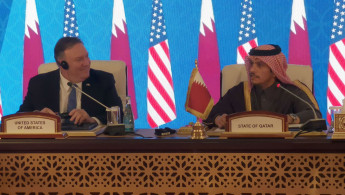Pompeo hails Qatar during visit to push for end to Saudi-led blockade
US Secretary of State Mike Pompeo arrived in Qatar on Sunday to push for an end to a diplomatic rift between Washington's Gulf allies on the latest leg of his Middle East tour.
Pompeo arrived in Doha on Sunday and signed an agreement with Qatari officials to expand the Al-Udeid Air Base, the largest US military base in the Middle East.
Pompeo described Qatar as a "great friend" to the US and said their relationship was "extensive, important and growing" during a press conference with Qatar's foreign minister.
"During our talks, I have stressed the importance of the unity of the Gulf Cooperation Council," Pompeo said.
Sheikh Mohammed bin Abdulrahman Al Thani also said his country's relationship with the US "has enabled us to confront so many regional and international challenges."
Pompeo's visit to the energy-rich Gulf state comes amid a more than 18-month-old dispute pitting Riyadh and its allies against Doha.
"It is time for old rivalries to end for the sake of the greater good of the region," Pompeo said on Thursday in Cairo.
The secretary of state travelled to Doha from Abu Dhabi, where he met with Crown Prince Mohammed bin Zayed on Saturday.
Pompeo is later expected to head to Riyadh, where all eyes will be on a possible meeting with Crown Prince Mohammed bin Salman.
The visit comes just three months after the murder of Saudi journalist Jamal Khashoggi in his country's Istanbul consulate. Pompeo told US media he would raise the issue with the crown prince, who has been accused of ordering the hit.
Saudi Arabia, the UAE, Bahrain and Egypt - all US allies - cut ties with Qatar in June 2017, accusing it of supporting terrorist groups and seeking closer ties to Saudi arch-rival Iran.
Qatar - also a US ally - denies the allegations and accuses the countries of seeking regime change.
Washington, which at first appeared to back the boycott, has so far been unsuccessful in trying to get the countries to set aside their differences in order to focus on Washington's regional priority - the fight against Iran.
Last week, retired General Anthony Zinny, a US envoy in charge of resolving the crisis, resigned citing lack of cooperation with his efforts.





 Follow the Middle East's top stories in English at The New Arab on Google News
Follow the Middle East's top stories in English at The New Arab on Google News

![Israeli forces ordered bombed Gaza's Jabalia, ordering residents to leave [Getty]](/sites/default/files/styles/image_330x185/public/2176418030.jpeg?h=a5f2f23a&itok=_YGZaP1z)
